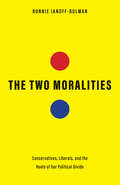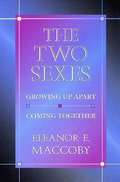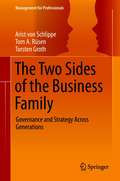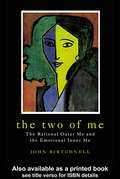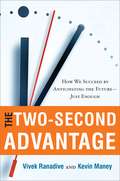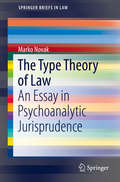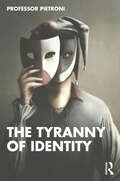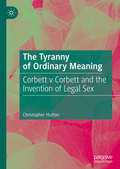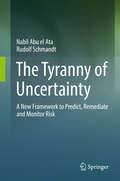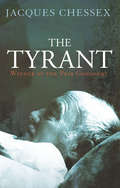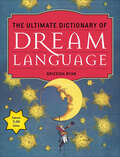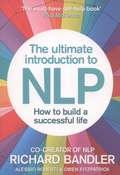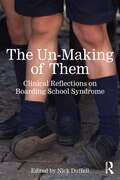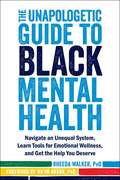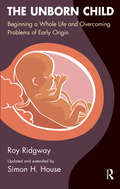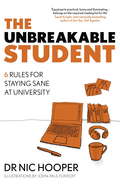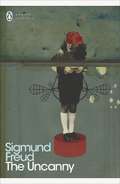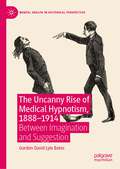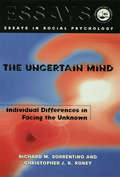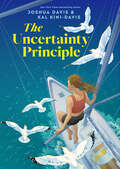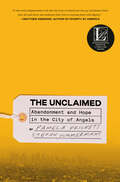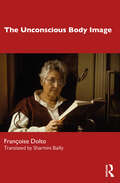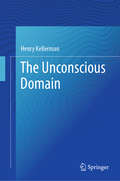- Table View
- List View
The Two Moralities: Conservatives, Liberals, and the Roots of Our Political Divide
by Ronnie Janoff-BulmanThe most complete picture to date of the moral worlds of the political left and right and how their different views relate to specific political issues The left and right will always have strong policy disagreements, but constructive debate and negotiation are not possible when each side demonizes the other. We need to move past our poisonous politics. In this book, social psychologist Ronnie Janoff-Bulman provides a new framework for understanding why and how we disagree. Janoff-Bulman asks readers to consider the challenging possibility that both liberalism and conservatism are morally based and reflect genuine concern for the country. Moral psychology is an invaluable lens for understanding the roots of political differences. She presents a &“Model of Moral Motives&” that maps the most fundamental motivations recognized by psychology—approach and avoidance—onto these differences. Liberal morality focuses on providing for the group&’s well-being and ensuring social justice. Conservative morality focuses on protecting the group from threats and preserving order. These moralities can account for the psychological differences between liberals and conservatives and for why certain positions resonate on each side of the political spectrum. Why, for example, do conservatives oppose abortion and favor unfettered free markets while liberals favor a woman&’s right to choose and economic regulation? Understanding that our political differences are rooted in two natural forms of morality can help us begin to detoxify our politics.
The Two Sexes: Growing Up Apart, Coming Together
by Eleanor Maccoby"This book is about sex (or gender) in the broadest sense: about how an individual's development from infancy into adulthood is affected by being either a male or a female. Although some individuals are hermaphrodites, the vast majority of human beings are biologically clearly either male or female. And, again in the vast majority of cases, the sex identity assigned to an individual by society, as well as the sex identity adopted by the individual, corresponds to the person's biological sex. This book will be concerned with the development of people who are unambiguously members of one gender category or the other. In many respects, males and females take quite similar developmental paths. But in some important respects, their paths diverge. In this book I begin by showing that when boys and girls are engaged in social play, they congregate primarily with others of their own sex during the preschool and middle-childhood years, and that different childhood "cultures" prevail in these gender-segregated playgroups. I will consider the set of possible reasons why this divergence occurs, and discuss the implications of childhood divergence for the ways in which males and females interact when the two sexes converge in adolescence and adulthood. In particular, I will consider how the different social histories of the two sexes affect the relationships of heterosexual couples, the way men and women relate to each other as co-parents, and the nature of same-sex and cross-sex interactions that occur in the workplace." The Family and Public Policy Series
The Two Sides of the Business Family: Governance and Strategy Across Generations (Management for Professionals)
by Tom A. Rüsen Arist von Schlippe Torsten GrothThis book focuses on a central success factor for family businesses: maintaining the decision-making ability over generations while not jeopardizing the business due to family conflict, inefficient governance structures, or lack of identification. The authors identify that this is not as easy as the endeavor to bring two social systems together with contradicting logic (family and business) leads to many dangerous pitfalls. This book presents outcomes of a unique research project in which family managers of eleven of the oldest and largest German family businesses, at least the fourth generation, met for more than three years on a regular basis and presented the essence of their family governance structures to each other and to the authors. It was a joint “learning journey” that admits identifying twelve core questions that these families had been answering to keep up the relationship between family and business successfully over generations. Obviously, there is no “right” answer to these questions. The key to success is rather engaging the families in a process to find out their own answers and make them aware of the “two sides”: being a family is different from being a business family.
The Two of Me: The Rational Outer Me and the Emotional Inner Me
by John BirtchnellHow much of what we do is directed by conscious, deliberate decisions and how much originates in unconscious, automatic directives? This is the question explored in The Two of Me via an engaging combination of phenomenological subjective investigation and objective considerations of mental processes and specific structures. John Birtchnell puts forward the thesis that many more of our actions than we might imagine are determined unconsciously. Not only are unnoticed automatic actions motivated unconsciously, but also seemingly conscious or 'thought out' behaviours are actually determined and reinforced by unconscious exigencies. Even where we produce a reasoned discourse taking responsibility for why we hold certain thoughts, there is always the possibility that these explanations serve and follow from an unconscious driving force. The conscious mind seems to act as spokesperson for both itself and the unconscious mind. Investigating this dual aspect of the person, the book addresses the issue across a range of mental processes including memory, language, problem-solving, dreams, delusions, hallucinations and more complex constructs such as the arts, humour and religion.
The Two-Second Advantage: How We Succeed by Anticipating the Future--Just Enough
by Kevin Maney Vivek RanadiveWhat made Wayne Gretzky the greatest hockey player of all time wasn't his speed on the ice or the uncanny accuracy of his shots, but rather his ability to predict where the puck was going to be an instant before it arrived. In other words, it was Gretzky's brain that made him exceptional. Over the past fifteen years, scientists have found that what distinguishes the greatest musicians, athletes, and performers from the rest of us isn't just their motor skills or athletic abilities--it is the ability to anticipate events before they happen. A great musician knows how notes will sound before they're played, a great CEO can predict how a business decision will turn out before it's made, a great chef knows what a recipe will taste like before it's prepared.In a powerful narrative that takes us from the research in the labs to the implementation of predictive technology inside companies, Vivek Ranadivé and Kevin Maney reveal how our understanding of human mastery is being applied to the way computers "think." In the near future, the authors argue, the most advanced computer systems and the most successful businesses will anticipate the future much like Wayne Gretzky's brain does. As a result, companies will be able to use a new generation of technology to anticipate customer needs before customers even know what they want, and see production snafus before they occur, traffic jams before they materialize, and operational problems before they arise. Forward-thinking companies will be able to predict the future just a fraction ahead of everyone else with a little bit of the right information at the right time--what the authors call the two-second advantage--and it will transform the way businesses are run and offer companies an enormous competitive edge in the marketplace.In the bestselling tradition of Blink, Sway, and How We Decide, The Two-Second Advantage will change our understanding of what makes a company successful.From the Hardcover edition.
The Type Theory of Law
by Marko NovakThisvolume presents a Type Theory of Law (TTL), claiming that this is a uniquetheory of law that stems from the philosophical understanding of Jung'spsychological types applied to the phenomenon of law. Furthermore, the TTLclaims to be a universal, general and descriptive account of law. To provethat, the book first presents the fundamentals of Jungian psychological types,as they had been invented by Jung and consequently developed further by hisfollowers. The next part of the book describes how the typological structure ofan individual determines their understanding of law. It then addresses the wayin which inclusive legal theory can be understood based on this typology. Finally, the book describes the TTL in general and descriptive terms and putsit into context. All in all, the book shows how the integral or inclusiveapproach to understanding the nature of law is not only in tune with our time,but also relevant for presenting a more persuasive picture of law than theolder exclusivist or dualist approaches of strict natural law and rigid legalpositivism did.
The Tyranny of Identity
by Patrick PietroniThe Tyranny of Identity is both a personal and highly interdisciplinary examination of the wide range of factors and disciplines at play in the formation of identity. It takes a novel and unique approach to this through use of metaphor, images, poetry and a wide range of academic sources to provide a holistic approach to the study of identity. This book uses the concept of Babushka dolls to show that we all have a series of activities during our lives that reside in our mind, body, spirit – each influencing the multiple identities we knowingly or unknowingly possess. This collage of factors and forces allows us to create an identity. The layers of identity unfold as the chapters progress and in doing so the book addresses the manifold ways in which identity intersects with nationhood, politics, education, the culture wars, family, religion, gender and contemporary institutions. The Tyranny of Identity is a wide-ranging, cross-cultural book that integrates and explores how the issue of identity has become a central issue in every academic discipline. This book is essential reading to all students studying identity and all readers seeking a deeper understanding of this complex topic.
The Tyranny of Ordinary Meaning: Corbett v Corbett and the Invention of Legal Sex
by Christopher HuttonThis book offers an in-depth analysis of the case of Corbett v Corbett, a landmark in terms of law’s engagement with sexual identity, marriage, and transgender rights. The judgement was handed down in 1970, but the decision has shaped decades of debate about the law’s control and recognition of non-normative gender identities. The decision in this case – that the marriage between the Hon. Arthur Corbett and April Ashley was void on the grounds that April Ashley had been born male – has been profoundly influential across the common law world, and came as a dramatic and intolerant intervention in developing discussions about the relationships between medicine, law, questions of sex versus gender, and personal identity. The case raises fundamental questions concerning law in its historical and intellectual context, in particular relating to the centrality of ordinary language for legal interpretation, and this book will be of interest to students and scholars of language and law, legal history, gender and sexuality.
The Tyranny of Uncertainty
by Nabil Abu el Ata Rudolf SchmandtThe authors offer a revolutionary solution to risk management. It's the unknown risks that keep leaders awake at night--wondering how to prepare for and steer their organization clear from that which they cannot predict. Businesses, governments and regulatory bodies dedicate endless amounts of time and resources to the task of risk management, but every leader knows that the biggest threats will come from some new chain of events or unexpected surprises--none of which will be predicted using conventional wisdom or current risk management technologies and so management will be caught completely off guard when the next crisis hits. By adopting a scientific approach to risk management, we can escape the limited and historical view of experience and statistical based risk management models to expose dynamic complexity risks and prepare for new and never experienced events.
The Tyrant
by Martin Sokolinsky Jacques Chessex'First published in France in 1973, this unbearably sad novel from Swiss author Chessex, the first non-French writer to win the Prix Goncourt, charts a man's slow but steady path toward tragedy.Chessex perfectly captures the juxtaposition of the profound and the banal in a surreal scene where a mortuary representative hawks different models of urns to hold cremated remains. Jean's burden of guilt only grows heavier with time, and the denouement will strike many as pathetically inevitable.' Publishers WeeklyA haunting work, reminiscent of Albert Camus, that portrays with exquisite psychological detail the emotional crisis in the life of Jean Calmet, a young Swiss schoolteacher. As we watch the father's cremation in the opening chapter, we sense that, even though his father's body has been reduced to ashes, his spirit survives to haunt Jean. His father's prodigious vitality and virility had crushed his family and ruined his son's childhood. Even after his father's death, Jean cannot be free. The parental ogre's actions continue to suck Jean into a vortex of despair.Jacques Chessex, a giant of Swiss literature, won the Grand Prix de la langue française and was awarded the Grand Prix Jean Giono for his entire work. Bitter Lemon Press published his novels The Vampire of Ropraz and A Jew Must Die to high acclaim. He died in 2009 at age seventy-five.
The Ultimate Dictionary of Dream Language
by Briceida RyanThe definitive guide to uncovering the secret meanings of your dreams—with more than 25,000 entries covered to interpret your subconscious messages.With more than 25,000 entries Ryan covers every dream symbol and message imaginable—from sex and love, to lucid dreaming, nightmares, and intuitive and premonition dreams. Ryan explains how dreams are sending messages about your past, present, and future that can help you in your waking hours. Readers learn what these dream messages say about love, success, numbers, and money. Now you can look up every dream you ever had and easily find out exactly what the secret dream language is telling you.From The Ultimate Dictionary of Dream Language:Playful Dog: Do whatever is necessary to cater to the people you love. Let them know how much you love them. Do not erect barriers or limit the time you spend with them. Do not become a parent to your mate or anyone else.Figure Skating: Within three days, you will be walking a thin line. This will make it very easy for someone to steer you in the wrong direction.Jacknife: Within two weeks you will receive a gift of greater mental inventiveness from the gods.Rooster: This is a very lucky symbol. If the rooster is crowing you will be victorious in those areas of your life you feel you will not succeed in.
The Ultimate Introduction To NLP: How To Build A Successful Life
by Richard Bandler Alessio Roberti Owen FitzpatrickRichard Bandler, co-creator of NLP and the man who inspired Paul McKenna to greatness, collaborates with Alessio Roberti and Owen Fitzpatrick to reveal how to unleash your true potential and transform your life. Richard Bandler - the world-renowned co-creator of NLP who has helped millions around the world change their lives for the better - has teamed up with Italian NLP Master Trainer Alessio and co-founder of the Irish Institute of NLP Owen, to craft a simple yet engaging story of one man's personal change and discovery, to help readers understand the remarkable principles of NLP. Inspiring and easy-to-read, this fable recreates the experience of being at a workshop with Bandler. Rather than explaining the theories, An Introduction to NLP illustrates the principles and simple techniques that Bandler has developed over the past 35 years in action. This inspirational book gives you the tools to change your life, overcoming the things that are holding you back: your phobias, depression, habits, psychosomatic illnesses or learning disorders. Through the simple techniques of NLP, you too can become a strong, happy, successful person and achieve your goals.
The Un-Making of Them: Clinical Reflections on Boarding School Syndrome
by Nick DuffellEx-boarders can be among the most challenging clients for therapists, with many clinicians struggling to address their unique needs. This book presents a groundbreaking collection of chapters sharing insights and reflections on clinical work with ex-boarders in different settings and circumstances with the aim of expanding the body of knowledge for therapeutic work with such clients.The contributors reveal that the fall-out from boarding is much wider than previously thought and also report on innovative treatment methods that may help therapists address these consequences with ex-boarders in treatment. Featuring the experience and insights of some 16 different clinicians, many of whom are ex-boarders themselves, this new collection offers contributions from a wide range of theoretical backgrounds, including psychodynamic, Jungian, transactional analysis and ‘energy psychology’. It tells how the understanding of the ‘boarding school syndrome’ has been enlarged by recent advances in attachment therapy, trauma studies, neuroscience, including pastoral, and safeguarding awareness within education. Topics covered include the effects of boarding on girls, on both intimate and sibling relationships, on military family boarders and on ex-boarder therapists, as well as how both careful, patient attention and dynamic EMDR may be used to alleviate boarding school trauma. The reader will gain a wider understanding about how individuals and society are impacted by this way of raising children and what evidence-based pathways to recovery are being evolved.This book is written in an accessible jargon-free style and will appeal to psychotherapists, psychologists, psychoanalysts and counsellors, as well as ex-boarders and parents interested in the impact of boarding schools from a professional or personal perspective.
The Unapologetic Guide To Black Mental Health: Navigate An Unequal System, Learn Tools For Emotional Wellness, And Get The Help You Deserve
by Rheeda WalkerWe can’t deny it any longer: there is a Black mental health crisis in our world today. Black people die at disproportionately high rates due to chronic illness, suffer from poverty, under-education, and the effects of racism. This book is an exploration of Black mental health in today’s world, the forces that have undermined mental health progress for African Americans, and what needs to happen for African Americans to heal psychological distress, find community, and undo years of stigma and marginalization in order to access effective mental health care. <p><p> In The Unapologetic Guide to Black Mental Health, psychologist and African American mental health expert Rheeda Walker offers important information on the mental health crisis in the Black community, how to combat stigma, spot potential mental illness, how to practice emotional wellness, and how to get the best care possible in system steeped in racial bias. <p> It’s past time to take Black mental health seriously. Whether you suffer yourself, have a loved one who needs help, or are a mental health professional working with the Black community, this book is an essential and much-needed resource.
The Unborn Child: Beginning a Whole Life and Overcoming Problems of Early Origin
by Simon House Roy RidgwayThe Unborn Child is essential reading for parents, potential parents and grandparents, as well as professionals with responsibility for children, and bringing babies into the world. This book describes prenatal and perinatal development, considering the legacy of health from both parents and grandparents. It explores the effects of the mother's mental and physical state during pregnancy, on the physiology and psychology of her expected child. The earlier in a child's development, beginning paradoxically before conception, that the wisdom of experience and science is applied, the greater the chances of a child's mental and physical health for life. Understanding these issues offers a way of healing early problems that contribute to such disorders as depression or compulsive behaviour. Here are invaluable guidelines towards generating children with their full genetic potential for basic health and emotional stability. This fascinating book is rooted in the experience of both authors, complete with authoritative case studies and scientific references. It has been extensively updated and restructured by the author, who has added entirely new material on nutrition from before conception.
The Unbreakable Student: 6 Rules for Staying Sane at University
by Nic Hooper'Equal parts practical, funny and illuminating - belongs on the required reading list for life' - Sarah Knight, internationally bestselling author of Get Your Sh!t TogetherSo, you're starting university - you've learnt what to pack, where to socialise, how to cook (sort of)... but what about how to look after your mental health?University is a whirlwind of exciting, fresh experiences. But it can also be overwhelming. You're in a strange new environment and faced with the pressure to make friends, complete difficult assignments, stay healthy, manage your finances and so much more, all while being away from your loved ones. In this time of massive change, looking after your mental wellbeing is more important than ever.Nic Hooper has witnessed the student mental health crisis unfolding every day on campus and is determined to help. A psychologist with fifteen years' experience teaching and mentoring young adults, The Unbreakable Student is his guide to navigating your university years and staying sane using six simple rules:· Using exercise to stay healthy in body and mind· Learning to positively challenge yourself· Connecting with your peers· Mindfully embracing the moment· Managing self-critical thoughts and vulnerability· Giving to others and taking positive actionAccessible and inspirational, The Unbreakable Student is the self-care guide that every university student needs.
The Unbreakable Student: 6 Rules for Staying Sane at University
by Nic Hooper'Equal parts practical, funny and illuminating - belongs on the required reading list for life' - Sarah Knight, internationally bestselling author of Get Your Sh!t TogetherSo, you're starting university - you've learnt what to pack, where to socialise, how to cook (sort of)... but what about how to look after your mental health?University is a whirlwind of exciting, fresh experiences. But it can also be overwhelming. You're in a strange new environment and faced with the pressure to make friends, complete difficult assignments, stay healthy, manage your finances and so much more, all while being away from your loved ones. In this time of massive change, looking after your mental wellbeing is more important than ever.Nic Hooper has witnessed the student mental health crisis unfolding every day on campus and is determined to help. A psychologist with fifteen years' experience teaching and mentoring young adults, The Unbreakable Student is his guide to navigating your university years and staying sane using six simple rules:· Using exercise to stay healthy in body and mind· Learning to positively challenge yourself· Connecting with your peers· Mindfully embracing the moment· Managing self-critical thoughts and vulnerability· Giving to others and taking positive actionAccessible and inspirational, The Unbreakable Student is the self-care guide that every university student needs.
The Uncanny (Penguin Modern Classics)
by Sigmund FreudAn extraordinary collection of thematically linked essays, including THE UNCANNY, SCREEN MEMORIES and FAMILY ROMANCES.Leonardo da Vinci fascinated Freud primarily because he was keen to know why his personality was so incomprehensible to his contemporaries. In this probing biographical essay he deconstructs both da Vinci's character and the nature of his genius. As ever, many of his exploratory avenues lead to the subject's sexuality - why did da Vinci depict the naked human body the way hedid? What of his tendency to surround himself with handsome young boys that he took on as his pupils? Intriguing, thought-provoking and often contentious, this volume contains some of Freud's best writing.
The Uncanny Rise of Medical Hypnotism, 1888–1914: Between Imagination and Suggestion (Mental Health in Historical Perspective)
by Gordon David BatesThis book explores the improbable rise of medical hypnotism in Victorian Britain and its subsequent assimilation and neglect. It follows the careers of the ‘New Hypnotists’: Charles Lloyd Tuckey, John Milne Bramwell, George Kingsbury and Robert Felkin. This loosely knit group all trained with the Suggestion School of Nancy and published books on hypnotism. They had to confront the many public and medical prejudices against the trance state which had persisted after the scandalous disgrace of John Elliotson and medical mesmerism, fifty years before. Hypnotism was a highly contested technology and in the 1890s the debates about safety and utility were fought in the national newspapers as well as the medical journals. The new hypnotists took on the might of the medical institutions personified by Ernest Hart, Editor of the British Medical Journal. However their timing was propitious, as the rise of faith-healing forced the medical profession to confront the non-physical therapeutic aspects of the doctor-patient relationship. The hypnotic discourse was shaped by these developments, but also by the fascination of the general public, novelists, occultists, psychic investigators, educationalists and spiritualists in the myriad possibilities of the trance state. Despite growing interest in the prehistory of British psychology and talking therapies, and the recent challenges to the primacy of Freudian histories, there are few accounts of the development of British ‘eclectic therapy’. This book uses the New Hypnotists as a lens to examine Victorian medicine and society, exploring their role in establishing the term ‘psychotherapy,’ and legitimising medical hypnotism, a precursor of psychological therapies.
The Uncertain Mind: Individual Differences in Facing the Unknown (Essays in Social Psychology)
by Richard M. Sorrentino Christopher J.R. RoneyThis book discusses individual differences in how people react to uncertainty. The authors show that while some people are relatively comfortable dealing with uncertainty and strive to resolve it (uncertainty-oriented), others are more likely to avoid uncertainty, preferring the familiar or the known (certainty-oriented). They go on to examine the implications of an uncertainty orientation for understanding processes of self-knowledge, social cognition and attitude change, achievement, motivation and performance, interpersonal and group processes, and issues relating to physical and psychological health concerns. Research is discussed which links this uncertainty orientation to each of these issues, raising important practical and theoretical questions for each. The book also considers possible implications for people of both orientations of living in times that may be characterized as being uncertain.
The Uncertainty Channel of Contagion
by Prakash Kannan Fritzi Köhler-GeibA report from the International Monetary Fund.
The Uncertainty Principle
by Joshua Davis Kal Kini-DavisAn epic, breathtaking story of self-discovery, love, and adventure from New York Times bestselling author Joshua Davis and his son Kal Kini-Davis, perfect for fans of Nina LaCour and John Green.Seventeen-year-old Mia is stranded in the middle of the Caribbean. After a mortifying incident in the school cafeteria, her parents decide there is only one way to deal with her meltdown: move onto a battered sailboat and leave everything behind. Her mom and dad think it&’s the best decision they&’ve ever made. Mia feels like she&’s been kidnapped and imprisoned in paradise with no internet and no destination.Her only hope is to hack together a solar-powered satellite phone so she can call her best friend and fix everything. To do it, she&’ll have to build a mobile laboratory on the boat and ignore her neurotic mother, who thinks Mia is falling apart.The problem is, Mia is falling apart. By day, she scours deserted islands, looking for anything she can use to build the phone. At night, she squeezes into a narrow bunk and talks to an imaginary friend. She knows, with absolute certainty, that she needs to abandon her family to save her sanity.And then two teenagers sail into her world, promising friendship, and maybe even romance. Thoughtful, soulful Alby was raised in Australia but now his family calls the sea their home. The only thing missing is his soulmate. Bold, beautiful Nisha is simply vacationing on her dad&’s megayacht when a chance encounter upends her life.Now—with everything hanging in the balance—Mia must decide who she is and what she wants. And with this decision comes the revelation that her past and future are more uncertain than she thought.
The Unclaimed: Abandonment and Hope in the City of Angels
by Stefan Timmermans Pamela Prickett&“A rare and compassionate look into the lives of Americans who go unclaimed when they die and those who dedicate their lives to burying them with dignity.&”—Matthew Desmond, #1 New York Times bestselling author of Poverty, by America&“A work of grace . . . Both cleareyed and disturbing, yet pulsing with empathy.&”—The New York Times (Editors&’ Choice)FINALIST FOR THE J. ANTHONY LUKAS BOOK PRIZE • ONE OF THE ATLANTIC&’S TEN BEST BOOKS OF THE YEAR • AN NPR AND BOOKPAGE BEST BOOK OF THE YEARFor centuries, people who died destitute or alone were buried in potters&’ fields—a Dickensian end that even the most hard-pressed families tried to avoid. Today, more and more relatives are abandoning their dead, leaving it to local governments to dispose of the bodies. Up to 150,000 Americans now go unclaimed each year. Who are they? Why are they being forgotten? And what is the meaning of life if your death doesn&’t matter to others?In this extraordinary work of narrative nonfiction, eight years in the making, sociologists Pamela Prickett and Stefan Timmermans uncover a hidden social world. They follow four individuals in Los Angeles, tracing the twisting, poignant paths that put each at risk of going unclaimed, and introducing us to the scene investigators, notification officers, and crematorium workers who care for them when no one else will.The Unclaimed lays bare the difficult truth that anyone can be abandoned. It forces us to confront a variety of social ills, from the fracturing of families and the loneliness of cities to the toll of rising inequality. But it is also filled with unexpected moments of tenderness. In Boyle Heights, a Mexican American neighborhood not far from the glitter of Hollywood, hundreds of strangers come together each year to mourn the deaths of people they never knew. These ceremonies, springing up across the country, reaffirm our shared humanity and help mend our frayed social fabric.Beautifully crafted and profoundly empathetic, The Unclaimed urges us to expand our circle of caring—in death and in life.
The Unconscious Body Image
by Françoise DoltoThe Unconscious Body Image espouses a completely original view of the links between physical and psychic development, providing fresh insight into our understanding of psychosomatic symptoms and child development. Françoise Dolto describes how unconsciously held mental images of the body and its functioning impact upon the subject’s feelings and ideas of themself, and conversely how emotions and ideas impact upon the body’s functioning by way of these unconscious images. The Unconscious Body Image also presents Dolto’s view of the development of mind in relation to unconscious body images generated at each stage of development (oral, anal, genital, latency and puberty), and ideas about psychic castration at each developmental stage and children’s socialisation, filling a significant gap in psychoanalytic understanding of the mental integration of social law. This book will be a key text for psychoanalysts in practice and in training, particularly those working with children, psychoanalytic psychotherapists and psychodynamic practitioners in the social sciences, childcare and education.
The Unconscious Domain (Springerbriefs In Psychology Ser.)
by Henry KellermanThis book enumerates the components of the unconscious domain (or realm), and attempts to uncover the proposed communicational network of its operation — a communicational network that is able to link inherent participating components of this realm. It is often the case that theoreticians and clinical practitioners refer to the unconscious or unconscious material in a way that implies the sense of it all rather than a specific definition, broadly describing it as “material which is out of one’s awareness.” This volume therefore examines the complex existence of the entire unconscious realm embraced in an evolutionary historical context, defined here as the 'unconscious domain'.
